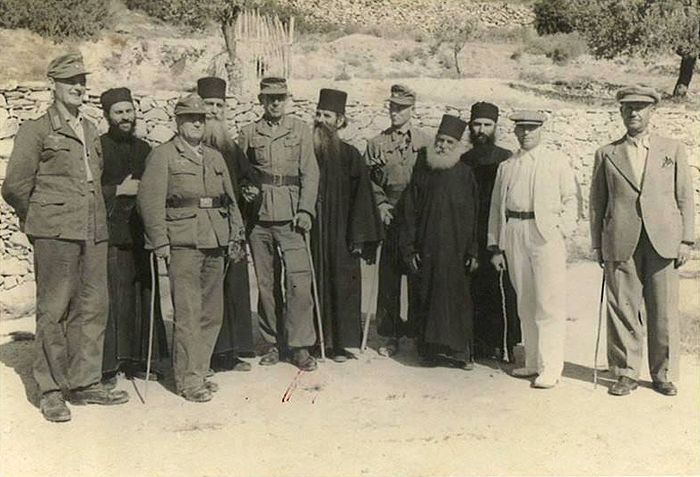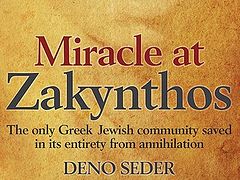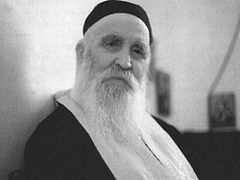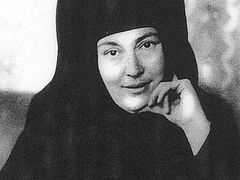On the night of May 14, 1944, a British submarine moored to the deserted shore of the island of Paros, and a military battalion made its way up to the village of Tsypido. The British men, having found a group of Germans sleeping, killed two of their soldiers, injured the commander of the aerodrome, lieutenant Tabe, captured seven Germans, and left the island.
In the morning, the Germans seized the young Nikolaos Stellas from the village of Levkes, accusing him of aiding the enemy, and after erecting a gallows on an elevated surface, hung him as a warning to nearby villages. Afterwards the military commandant at Paros demanded that the head of every local community send him their young men—125 in total!—in order to also have them executed.
The heads of the communities, the priests of the island, and the abbot of the Longobard monastery, archimandrite Philotheos (Zervakos), called together a council. There they decided to go to the commandant and ask him to cancel the sentence. However, straightaway he answered that he will not accept any visitors, and his decision could not be appealed! After that, three people—Abbot Philotheus, Dr. Aliprandis, and Mr. Kavvalis, the head of one of the communities—were chosen to go to the commandant of the Castle of Paros, lieutenant Sasse, and ask him to appeal to the commandant of the island so that he might pardon those who were sentenced.
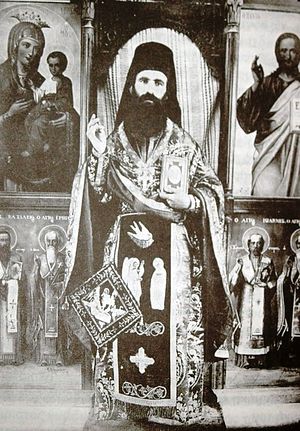 Sasse answered, “I have already asked him not to kill so many innocent men, but he declared that whoever dares to intercede for them will be publicly punished! I can only suggest one thing: Let the abbot invite the commandant to the monastery, receive him with the utmost attention, and then plead for the sentenced men. Maybe then he’ll be merciful. I have told him a lot of good things about the monastery and he listened to me with pleasure".
Sasse answered, “I have already asked him not to kill so many innocent men, but he declared that whoever dares to intercede for them will be publicly punished! I can only suggest one thing: Let the abbot invite the commandant to the monastery, receive him with the utmost attention, and then plead for the sentenced men. Maybe then he’ll be merciful. I have told him a lot of good things about the monastery and he listened to me with pleasure".
Father Philotheos didn’t lose time. He immediately invited the commandant of the island to come visit the monastery. Over the phone he answered that he’ll come to the monastery next Sunday, accompanied by six civil and military officials.
On the appointed day, the commandant arrived together with his retinue. He was, as befits a Nazi commandant, strict and unapproachable. But the abbot’s heartfelt attention and the loving attitude of the monks softened him, and he began to behave more humanely. The commandant also attended the evening service, during which, without his knowledge, a special prayer was read for the salvation of those sentenced to death.
The service was over, and the Germans were about to leave. Father Philotheus was thinking about how to start a conversation on the matter that was worrying the entire island of Paros. But the Mother of God herself helped the abbot, having performed a miracle: The commandant told the abbot that he would like to do him a favor by fulfilling a request. Father Philotheos plucked up his courage and asked for a one-on-one conversation. He thanked the commandant for his noble offer, and then said:
“I’d like you to first promise to fulfill that which I will request”.
The commandant extended his hand to him and promised to fulfill any kind of request.
“I ask you,” said the abbot, “to spare the lives of the young people sentenced to death, for a punishment like this is absolutely unjust!”
But the commandant answered:
“Ask anything you’d like except for that! I can’t fulfill such a request—that’s not up to me. There’s an order from higher up that for each German killed, fifty Greeks from the surrounding area where the German was killed must be sentenced to death. If I don’t fulfill the order, even though it may be unjust, I’ll be sentenced to death myself. So ask for something else.”
The abbot began to insist:
“But you’ve promised to do what I ask! You must keep your word.”
The commandant was adamant. So Father Philotheos then decided to sacrifice himself.
“Alright,” he said, “then here’s a different request: Let me be included among the number of those who are sentenced to death!”
The commandant was astounded. After a couple of minutes, he nervously said:
“I give you their lives! Only you must warn the inhabitants of the island that no more incidents like this occur, because the next time I will not spare anyone!”
The abbot promised, and the Germans left the Longobard monastery. Thus, the inhabitants of Paros were saved.
From the book “Charisma and Charismatics: An Anthology of the Manifestations of the Gifts of Grace”, vol. 3, The Holy Monastery of the Paraclete, Oropos, 2009.

